#He's so human for it! This is a story where no-one is morally black or white! *People* aren't black and white!
Note
I love Jiang Cheng and I hope you agree. The most tragic thing about yunmeng siblings is that JC and WWX really love each other the whole time… I like to think they can fix it someday

Someday perhaps....in the meantime, I bet he's loving having dogs run around lotus pier. As a WWX deterrent of course. No therapeutic reasons at all.
#Poorly Drawn MDZS#MDZS#Jiang Cheng#As much as I put him on blast#I do like JC quite a bit.#Man....I'm sad you're on anon cause I'd love to talk more about the yunmeng sibiling tragedy#Part of me so badly wishes that they do reconcile after some time#though a good tragedy comes from the pain of what could have been#JC is definitely in my top 5 mdzs characters and its absolutely due to how messy he is#ngl I can kinda relate to where his hurt comes from and it makes it very interesting to analyze.#Favourism and antagonism of parents messes up sibling dynamics so much#The grief and trauma ended up causing a rift not a shared moment of solidarity#JC is a counter-representation and a foil to how LWJ deals with his grief#as heartbroken as LWJ is he...keeps his life going. The grief settles and he doesn't forget but he *moves forwards*#JC doesn't! He can't! He has so much guilt and regret and the grief stagnates him! Love and grief can become so terribly consuming!#He's so human for it! This is a story where no-one is morally black or white! *People* aren't black and white!
371 notes
·
View notes
Text
Divine Favour | Sukuna x Kitsune!Reader (TEASER)
#full is NSFW, mild yuuji/reader, yuuji and gang are v early 20s, heian sukuna, male reader, typical kitsune shapeshifting, mentions of abuse, typical canon violence, morally grey reader, sukuna has FEELINGS but is BAD AT FEELINGS
A/N: this fic is so long rn lol I just have to release a piece of it into the wild :sob: feel free to reply if you want to be tagged for the full story when it's ready
☆☆☆
You were never supposed to be anything more than a trinket. You were a gift from some family trying to show off for Sukuna, so much so that they offered him a delicacy, something he surely didn't have yet–a yokai. A kitsune, to be more exact. One with peculiar black tails.
Sukuna found it interesting, and similarly desperate, to be brought such a creature as tribute. Certainly, it was meant to be seen as a high honour, yet somehow it felt…off. Why would humans give up something so powerful?
Unexpectedly, it'd be you who told him.
They submit me for the sake of convenience and mockery, your withering voice whispered where no one else could hear. You sounded weak. Tired. Maybe afraid, yet brave enough to reach towards the king and unveil the intentions of the men who brought you before him.
Sukuna's eyes flicked to you, his feigned interest in what the sorcerers said falling straight into dismissal. You were much more intriguing.
“Oh?” Sukuna asked, a smile creeping onto his face. The speakers ceased their jabbering and stared at your back with fierce intensity. Sukuna grinned wider. Oh, how he loved the way fear twisted mortal faces.
You didn't shift or crumple into yourself under the eyes of so many, however. You pushed on with what little energy and life you had, so intent on dragging that clan through the mud.
What I say is true, you assured simply. I expect to die today–
“Speak so everyone hears you, fox,” Sukuna commanded.
“--so I–I–” you coughed and cleared your throat, trying to rid your voice of the scratchy, weakness it struggled through. “I wish to not die with regrets.
“They have rendered me ill and unable to produce children, they see the black of my tails and regard me as an ill omen; yet they bring me to you, daring to spin sweet tales about the value of such an offering. But they lie,” You hissed. Your eyes glinted with molten malice, and Sukuna fell captivated. “They throw me to you as they would diseased meat to dogs.”
The courtyard fell silent, and Sukuna basked in it. You really were such a little troublemaker. A quietly chaotic force of nature.
The king stood, rolling his shoulders as he did, and his pride flared as you dropped to your knees before him in respect. He walked to you and patted your head as one might a child's before appraising the sorcerers stood before him.
“What a disappointment,” Sukuna sighed, raising another hand. The couple took up position, pooling their cursed energy in hopes of fending off the monster standing before them. The effort was quite cute. “Here I thought your clan might actually earn my mercy.” His hand dropped as the two lunged. Then, the two clansmen fell, too, both in neat, vertical halves. Quite overkill, yes, but he had a point to make.
Where he expected a reaction from you, he got nothing. Only panting and poorly-stifled coughs came from you, racking through the entirety of your skin and bones frame. Sukuna could see it up close now, the way your body trembled from fatigue, the sickly greying of your skin, the scent of disease clinging to you.
That wouldn't do. Sukuna liked his things to be in good shape.
“Uraume,” Sukuna droned as he stared down at you, “fix this.”
#sukuna x reader#ryomen sukuna x reader#sukuna x male reader#sukuna x m!reader#sukuna x you#jjk x you#male reader insert#male reader#jjk x reader#jujutsu kaisen reader insert#jujutsu kaisen x male reader#jujutsu kaisen x you
326 notes
·
View notes
Text
There's so much negativity around Izzy's death so I wanted to address some of the points I keep seeing thrown around.
"Izzy's death was pointless"
No, he just had his big speech about how basically they can kill him but they cannot kill the movement. That is a clear paraller to a lot of real life protestors of unjustice. He died protecting the community, he died so the community could go on.
"Izzy's death made his healing pointless"
No it didn't. Healing is always good, feeling happiness and belonging are ALWAYS worth it. We never know how long we've got, doesn't mean we gotta stop trying to be better or happier. His healing was still real. It still mattered.
"Izzy's character arc was left unfinished, it's bad writing"
Oh my god. If you open any writing guide about how to write impactful deaths, and the first thing that comes up is to leave some part of their arc unfinished. And his arc did go through quite a beautiful line, sure there could've been more but his story didn't end like, mid arc. As a writer, of course you want to make the audience sad when a character dies. It's good storytelling. Good stories are supposed to make us feel.
"Izzy died on the arms of his abuser"
Where the hell did this idea come from? Ed and Izzy have been in a toxic codependent relationship way before this show started. You could argue that Izzy was Ed's abuser, but that is not the argument I want to make here. Yes, we saw Ed driven to madness shoot Izzy on screen, but we know Izzy's the one that forced him to be Blackbeart when he didn't want it anymore. There's turmoil all around them. But the final moment is them finally meeting as people, not as components of Blackbeard.
"Izzy's death was unnecessarily awful"
His death was sad, yes, but it was quite beautiful as far as deaths go. He was surrounded by family who cared for him. He was loved, and accepted as he is. He knew his legacy will be carried on.
"They killed off the only character that showed us healing is never too late"
Did we watch the same show? That begins with then unhappy 40+ year old Stede deciding it's finally time to reach for his dreams? Where we see Blackbeard slowly gaining back his humanity? Where Black Pete starts off as toxically masculine dude but ends up in a soft gay marriage? Where most of the crew wanted to mutiny but then they realized being soft is good, actually. Jim's whole purpose in life being revenge but them learning to let that go and instead concentrate on love and fun and family. And so on. Izzy's arc is beautiful, but he's not the only person healing who thought it was too late already.
"Izzy's death was bury your gays trope"
No, what, no. In a pirate show where everyobody is queer some queer people will die. Bury your gays is about only having one or few queer characters and killing them off while the straights get their happily ever afters. This is so far from that.
Also, I want people to be aware of the phenomenon, where creators of diverse shows are subjected to more critism than those of non diverse shows. If this intrests you, Sarah Z on Youtube made a great video on it called Double standards and diverse media. Our flag means death has given us so much, queer love story with a happily ever after, finding community, nonbinary character. And the creators have always been so kind to fans, so let's show them tht kindness back. Because critizicing this one aspect can easily turn to seeming like the whole story is just unwanted. That stories like Ed and Stede's aren't worth telling. And I'm so aftraid that will happen, when just now for the first time in years we are finally getting queer stories.
Also, I understand people are sad. I am sad too - Izzy was an amazing character and his death was sad but that's just. Good writing. You can grieve, but trying to turn it into a moral or dramaturgy issue is just not a good look. And attacking the creators of this wonderful show is just horrible.
Remember - this fandom is a safe space ship 🏴☠️🏳️🌈
#ofmd s2#ofmd season 2#ofmd#ofmd spoilers#izzy hands#our flag means death#ofmd meta#ofmd izzy#blackbonnet#gentlebeard
525 notes
·
View notes
Text
There's a specific concept from Good Omens that I really like (amongst many others), that I was chuffed to also find in a Sandman and a Discworld story!
I love that in Good Omens (both book and TV), Heaven and Hell are presented as mostly redundant and ineffectual when it comes to human morality - and that Hell in particular find some of the things humans do to be pretty shocking, and/or instructive.
Opportunities for humour aside, this idea flies in the face of the common belief that the world's worst ills are the result of outside forces influencing people to do evil (ie the devil. Or ... lizard people etc? I digress). And it's unlike other stories out there that are like, "World War II was actually caused by xyz characters!" or similar. Good Omens doesn't rewrite history like that, or let us - humanity - off the hook when it comes to the big stuff, when it could so easily have done so in a universe where Heaven and Hell are literally real.
The story, of course, also credits human cleverness to humans, and celebrates the things we should be proud of, like art, music, delicious food, craftmanship, invention, etc. And it credits humans for having a propensity for compassion and goodness.
"[Crowley] did his best to make their short lives miserable, because that was his job, but nothing he could think up was half as bad as the stuff they thought up themselves. […] And just when you'd think they were more malignant than ever Hell could be, they could occasionally show more grace than Heaven ever dreamed of. Often the same individual was involved."
I love this concept because I see it as an uncoupling of religion and morality. They can both exist together, but the former isn't necessary for the latter. (This isn't the only possible interpretation; the more literal reading might be more about free will, but this is where I extrapolated it to).
From Sandman: Season of Mists Episode 2 (plot context stripped out to avoid spoilers, but skip ahead to black text if you want absolutely nothing spoiled if you want to read it).
Lucifer: "And the mortals! I ask you - why? […] Why do they blame me for all their little failings? They use my name as if I spend my entire day sitting on their shoulders, forcing them to commit acts they would otherwise find repulsive. 'The devil made me do it.' I have never made one of them do anything. Never. They live their own tiny lives. I do not live their lives for them."
And from Eric, a Discworld book (this one's related to Hell learning from humans, more than morality/free will... I won't spoil the funny by elaborating!):
"Earl Beezlemoth rubbed one of his three noses.
'And humans somewhere thought this up all by themselves?' he said. 'We didn't give them any, you know, hints?' […]
The earl stared into infinity. 'I thought we were supposed to be the ghastly ones,' he said, his voice filled with awe."
Another commonality between these two stories that isn't directly shared by Good Omens (yet...? still have another season coming …) but that I like enough to point out, is the idea that Hell is a place where people end up if they believe they deserve to go there. I like this because a lot of people are influenced to feel guilty about "sins" that are innocuous parts of normal human behaviour, so it's pretty brutal to fear going to Hell over them. There's comfort in this idea, to me. (granted, the following Sandman quote states this less explicitly but I take the same meaning from it … but lmk if I've done a reading incomprehension; I also haven't read all the books yet).
From Sandman:
Lucifer: "And then [the mortals] die, and they come here (having transgressed against what they believed to be right), and expect us to fulfill their desire for pain and retribution. I don't make them come here."
From Eric (partial footnote near the beginning):
"Interestingly enough, the gods of the Disc have never bothered much about judging the souls of the dead, and so people only go to hell if that's where they believe, in their deepest heart, that they deserve to go."
Eric also really leans into the idea of Hell being a bureaucratic, corporate, boring nightmare, also familiar to Good Omens fans, and the demons are so over it. The tone (you could probably guess) is very different from Sandman, and it's one of the earlier, less-serious Discworld books; it's a very fun, absurd ride of a read!
There are a few other Discworld books I'll talk about in a future post, that may also be of interest to certain Good Omens fans (I'm gearing these posts toward the fans who came to Good Omens from the TV show and haven't had the pleasure of discovering Neil's and Terry's other work yet); the ones I have in mind examine religious extremism, and the uncoupling of religion and morality too. A couple of them also have queer themes, if that is also your jam! (Less shipping opportunities but I assume some fans, like me, like the rest of the material in GO in addition to the love story).
I'll end this with a quote from a footnote from Eric that has nothing to do with anything in this post, but which took me by surprise and had me laughing days later whenever it came to mind. It's referring to books in a section of the library:
"Just erotic. Nothing kinky. It's the difference between using a feather and using a chicken."
And another bonus one that I found while looking for the first:
"Rincewind had been told that death was just like going into another room. The difference is, when you shout, 'Where's my clean socks?', no one answers."
I hope this made sense and is maybe interesting to someone ... I had fun talking about this at least!
#good omens#good omens meta#good omens 2#sandman#discworld#neil gaiman#terry pratchett#gnu terry pratchett#crowley#eric#eric faust#rincewind#p
86 notes
·
View notes
Text

DEMO
Currently finished—Prologue, Chapter One, Chapter Two, Chapter Three. ~81k words, average playthrough ~30k.
———
His flesh, our sustenance. His blood, our drink. His bones, our foundation, His body, our haven.
Five hundred years ago, the Earth was dying. Water polluted, dirt infertile, forests and meadows crumbling to the wars of steel and fire. And so the Order called His Grace, the Lord of Communion, down from where he rested before and He allowed humanity to rest inside his body.
Or at least, that's the story the Order tells.
You grew up under the masked faces of their Exalted, under the stories of Earth past. Rusted metal and cracked plastic; His bone and His flesh. Conflicting worlds, conflicting times, and soon, it might all come to a head.

Play as a recruit of the Order, an Exalted.
Be male, female, or nonbinary.
Customize your appearance.
Romance five separate characters.
Shape yourself—are you pragmatic or empathetic? Do you speak out or remain silent? Do you trust the Order, and do they trust you?
Align yourself with different factions based on moral imaginings.
Experience a world of greater things than you can imagine, but where your choices still matter.

Tallis/Talyn/Taira: Green eyes and long, auburn hair. Your childhood friend—Or, at least, companion. They aren't the biggest fan of the Order. Perhaps that will have greater implications than simple complaints as the situation grows more dire.
August: Blonde, sharp, and severe, he's the one who brought you into the fold. A zealot, some might call him. The Order doesn't name His Grace as a God, but August certainly seems to think that He is.
El: Long, thick black hair, skin tanned and freckled. She's a mechanic of the Order. Talented, there's no doubt about it, despite her occasional airheadedness. Sometimes, you can't help but feel that she's hiding something.
Jasper: Gender selectable. Muscled either way, with dark skin and deep brown eyes. Loud and arrogant—and they have what it takes to back it up. As the first new arrival to the Commune in… all of history, they could pose as an omen or a savior. Either way, they might shatter everything that you thought you knew.
Icarus: The Head of the Order. Everything else about them is shrouded in mystery.

Copious mentions of blood/flesh(Nonhuman, not caused by violence.)

DISCLAIMER: I'm a student and a slow writer in general, so updates might not be very frequent. Nevertheless, I'll try to see this story through.
3/7/23: First posted with Prologue and 1/2 of Chapter One, ~22k words.
3/11/23: Second half of Chapter One was posted. Story now at ~30.5k words.
4/27/23: Chapter two posted, bringing story to ~47k words.
9/30/23: Chapter three posted, bringing story up to ~81k words.
Up next: Chapter four.
For more information, see: Forums page.
#interactive fiction#choicescript#if wip#parasitical if#choice of games#hosted games#cog wip#dashingdon#cyoa#interactive game
540 notes
·
View notes
Text
I’m already seeing male reactors get very verbally defensive about that scene in She-Hulk where Jennifer describes how, simply as a woman, she has more experience in suppressing rage than Banner because speaking out will get you labelled “hysterical”, “emotional”, “difficult”, “too much of a feminist”, the list goes on. And if you snap back at the wrong cat-caller, you can get murdered. So now mcu bros are rushing at the opportunity to cry out “this is just another ‘marvel throwing in another woke scene for woke’s sake’. But like...it isn’t untrue. Comic nerds are all for female superhero protagonists until she, god forbids, talks about the dynamics of what it’s like to live within the confines of patriarchy.
MCU fans are always clamoring for the social commentary to be more “subtle” and not so “in-your-face”, just so they can mindlessly enjoy a punchy fighty show and not have to confront any real-world intersections with racism, misogyny, xenophobia, transphobia, all the -isms and -phobias you can imagine. Additionally, even when the social criticisms are embedded into the story, the conflicts are routinely either overlooked or watered-down and discussed at the individual-level as if these are just isolated incidents and not reflective of larger phenomena. Dudebros forget that superhero comic media, from the very beginning, has always been political. A lot of the mainstream characters we know and love today were created in response to the anti-war and peace movements during the seventies in the United States (this is also not to say that there isn’t some definite war propaganda and Red Scare-inspired comics out there either).
Comics are teaching grounds for morality, human good, and bad, power, greed, corruption. Comics have been about the social commentary from the get-go. The idea that the government (and by extent society at large) is villainizing and surveilling a specific minority group who carry varying physical and genetic traits contrasting to that of the “ideal national subject” because of a perceived inherent aggression or difference based on their physical attributes *ahem ahem mutants*...where do you think they got that from?
I literally sat through a dude being like “IN MY EXPERIENCE AS A MAN, THAT IS NEVER THE CASE! IF A WOMAN GETS UPSET AND MAKES A SCENE IN PUBLIC, THE MAN ALWAYS LOOKS LIKE THE BAD GUY BECAUSE IT IS ASSUMED HE DID SOMETHING WRONG. MEN ARE THE ONES WHO CAN NEVER BE ANGRY.” (Obviously for Black men, my argument is different because when Black men express rage, they are viewed as a threat or turned into spectacle, but the person who made this rant was not a Black man, nor was he factoring race into his argument). As if masculinity and gratuitous violence have not become nearly synonymous. When male celebrities are accused of beating their partners, fans run to their defense to say “well she shouldn’t have provoked him.” When Will Smith slapped Chris Rock, the internet rooted for a televised boxing match between the actors/comedians. We all watched the Trump and Hillary debates right, where his belligerent behavior was coddled while she had to maintain composure?
We’ve collectively grown up watching male newscasters, talk show hosts, and reporters make jokes about angry women in sports, in the media or in news reports being on their periods, as a way to minimize the stressful and abusive circumstances, or people, women are subjected to. The world expects women to react to harassment with class and elegance; women’s anger, Black women especially, is never not mitigated. For male fans to come away from that scene wanting to eye roll is why the commentary is so “in-your-face” because a lot of y’all still don’t get it! Men are still finding ways to make women’s issues about them and the “loss” of their rights. In a world where Brock Turners are able to walk free, are you really trying to argue against this scene? Really? What else do you expect out of a series whose main character is AN ATTORNEY? Y’all are just not going to enjoy this series then, as per usual.
#if you're wondering who the youtuber in question is it is jaby koay from the channel#getjaby#he also has another channel but im not trying to promote his shit#he does reactions to loads of things but i literally want to beat his ass everytime he opens his mouth to make some social hot take bc#you might as well be talking to fucking ricky gervais#he gives major centrist vibes nd he's so fucking condescending nd will jump at any opportunity to mansplain things to his female co-reactor#he's like i'm woke but only to a certain point#anyways fuck dudebros#also are we gonna act like this she hulk scene is more shoe-horned in than that scene in endgame? let's be real#just say you hate hearing about any issues that affects anyone ever who isn't a white man#she hulk#she-hulk#marvel#mcu#mcu rant#tatiana maslany#jennifer walters#hulk#bruce banner#reactors
1K notes
·
View notes
Note
Hey I was wondering since you are very familiar with superhero comics/media and I am not: I remember reading on TVTropes about how there was some comic arc where Superman is basically forced to kill the Joker/does it under extremely understandable circumstances, but then immediately jumps off the slippery slope and becomes a horrible mass murderer. SO, I was wondering if Amy in Worm is a commentary/take on this, on what kind of warped understanding of morality taught by someone's family environment would one have to have to actually believe breaking one's principles once while being forced to by a serial killer would make you into an irredeemable villain forever, and what kind of trauma and warped understanding would you have to have for that to actually be TRUE and for you to actually do horrible things afterward. Emphasizing that that kind of moral arc is not how normal humans work and there would have to be very unusual circumstances for it to happen. But since I don't know about superhero comics I can't really elaborate on this, so I wonder what you think of the idea.
So the specific arc you're talking about was Injustice: Gods Among Us, and the tie-in comics produced as a backstory for that video game- which came out in 2013 onward, so the times don't line up for Amy to be a commentary on that arc specifically. In particular, Superman has basically the exact opposite issue that Amy does; he killed Joker because he murdered an entire city, and he justifies his subsequent slide towards tyranny on the grounds that he wasn't being proactive enough to stop things like that beforehand. Kind of a common refrain in "Superman loses it" stories- refer in particular to the "I did love being a hero. But if this is where it leads, I'm done with it" scene from the Justice Lords arc of the old Justice League cartoon. (Batman is occasionally painted as having a "murder-is-like-potato-chips" problem, refraining from killing because he wouldn't be able to stop. Depends on the writer, though.)
What Amy absolutely is commenting on is what I think was a very pervasive idea in cape comics in the years when Worm was being formulated- the idea of the hero/villain binary as a real and meaningful thing, two meaningful categories of people which you can switch between as a discreet and meaningful action. Black Knight, Hawkeye, Rogue- all superheroes who started as supervillains, two distinct statuses which they held. Characters like Deadpool and Harley Quinn start as villains and drift towards a third-position antiheroic middle-ground that's treated as noteworthy for not really falling into either camp- in turn sort of generating what basically amounts to a third cluster, a coherent trinary. (A lot of 90s anti-heroes reifying the binary in how they're marketed as violating it.) Not actually many heroes I can think of who've gone full villain and had that stick, but definitely heroes who've flipped for a time in a meaningful way- Hal Jordan becoming Parallax sticks in my head. And at least since the 80s you've had writers making post-modern gags about powered people who opt out entirely and have day jobs using their powers for something mundane. (The X-Men are all over the place in here.) And subdued but gradually swelling in popularity is where Worm lands- the idea that what you're actually looking at here is a mob of agents, with their own granular agendas, alliances, outlooks, lines in the sand, and relationship to the law-as-written- that when a hero starts acting villainous or a villain does something heroic, when they approach a fifty-fifty split without actually changing their label, it's an indictment of the idea you can actually broadly group them so neatly in the first place.
And there's a lot of clunky dialogue in parts of Worm where characters are treating the hero/villain binary as a real tangible thing- "hero behavior, villain behavior-" in a way that seems hilariously naïve and awkward from where I'm sitting in 2023, and indeed was probably kind of a no-duh moment even in 2011. Anti-heroes had been around for a while. But I do think that those sequences were written in conversation with an assumption about the genre that wasn't totally dead in the water at the time, an assumption that Amy holds as a way of showing how treating the categories as innate will drive you nuts when they fail to model reality. I genuinely believe that the MCU and DCEU have killed this binary dead in the general consciousness, though. These days a "superhero" is whoever the protagonist of the movie is, and the idea that that can encompass a whole range of moralities is pretty strongly cemented. A supervillain is whoever fights the star of the movie once and then dies. It's whoever is creating a problem right that second, not a social role you hold for a prolonged period. In this way and some others, Worm hasn't been commenting on the dominant paradigm of superheroism in some time- it's becoming kind of a period piece.
#wildbow#parahumans#worm#worm analysis#meta#thoughts#ask#asks#some comparison to be made to gender by someone I'm sure#not my bailiwick however
68 notes
·
View notes
Text
Sunny Day Jack - Mafia AU - Family Business
After my last post about the Blouin family in the Mafia AU for Something's Wrong with Sunny Day Jack I wound up going on a little extra ramble over on my twitter (calling it X is too weird for me) about how the family business got started. I figured I'd post it here too to make it easier to read and reference later.
It all started with a small business run by the beautiful Alma Blouin and her husband ???
I'd call him [Redacted] but that alias is taken already, so let's stick with what was written in the family tree, shall we?
I was inspired by Makes me Smile, an engaging story written by Sauce that takes place in the SunnyTime Town AU, that it actually started as a family-run traveling carnival that was a cover for more shady business. The family name and business wound up taking up some permanent roots in St. Valens because of Marceau.
There were more opportunities in that crime-riddled city to do backrooms deals, score illicit substances, and other stuff like that. St. Valens was a city rife with crooked cops and people with dubious morals. Sadly, this hasn't changed in present day. If anything, it's only gotten worse. It just can hide behind a shiny new coat of paint and colorful smiles thanks to the Blouin family taking over so many local businesses under their brand name of SunnyTime LLC.
Lucy Connolly is actually responsible for the SunnyTime brand, which is one reason why she kept her last name even after marrying Marceau Blouin. Since she was young, she wanted to make it big in the city, really clean up the town. She succeeded in making it big, but somewhere along the way she got sucked into a world full of sin and vice where her formally black and white view of morality was blurred with many shades of gray. She's still trying to do the right thing, particularly for her family and people she wants to protect, but sometimes she found it was necessary to do morally questionable things to do it. It was a slow corruption of innocence in a sense.
In a way, Jack gets his more twisted view on right and wrong from Lucy, as Marceau is a bit more up front about how messed up the criminal underworld is and their involvement in it. Jack tries to keep things as "friendly" as possible if he can help it, so to speak.
Marceau started off the business in St. Valens with an entertainment club. You had to know the right signs to get access to the good stuff they didn't show on the menu, stuff that could get you thrown in jail if you didn't have the money to pay off the cops.
One night, Lucy stopped by the club that had suddenly got so popular, thinking it was entirely legitimate, and it led to that fateful first encounter between her and Marceau.
Marceau didn't think he'd be staying in St. Valens long, even if he was trying to take advantage of the place for as long as possible, but Lucy was invested in the city, as it was her hometown. She was friendly and outgoing, and she knew a lot of people there. She grew up with them.
Lucy had a good sense for business, which places would be good to snap up for a song. She knew about the issues with many local gangs and how they intimidated local businesses into giving them a cut of their earnings to not get roughed up. She wanted to stop that sort of thing from happening so that innocent people could live their lives without fear.
Which is why the Blouin family in the present does take care of the citizens of St. Valens and stomp out more unsavory practices like human trafficking. Essentially Lucy wanted justice and went vigilante. (Insert Joker reference/joke here.) When it became clear that not everyone she tried to save was good, well…
That led into her corrupted world view and a more "ends justify the means" approach.
Marceau had been taught to watch his back and stand on his own, not having the best home life. In a sense, Lucy taught him to care more about others, that he could have someone he could trust to watch her back, and he taught her how to not let others take advantage of her and those she cares for.
Really, in the present day, the Blouins own a lot of businesses in a variety of sectors, from entertainment to scientific research to home electronics to weapons manufacturing. They're spread out across not just the SunnyTime LLC brand, but plenty of sub-companies with different names that the average person might not realize is owned by them. The SunnyTime brand has become a known trustworthy across the country and are spreading out slowly internationally.
Well… technically the family business is known internationally, just not in any public circles, and not under any brand name. Marceau alone has committed quite a few international crimes, though no one has been able to pin anything on him publicly. Lucy does a good job of keeping their public facing image squeaky clean, and she won't anyone hurt or take away any of her family.
Now that Jack is in charge, it's his turn to take care of the family and the business. Despite his issues with human touch, both them, and his sunshine, are in good hands.
@channydraws @earthgirlaesthetic @sai-of-the-7-stars @cheriihoney @illary-kore @okamiliqueur @kurokrisps
#Sunny Day Jack#DachaBo#Aphrodesia#Something's Wrong With Sunny Day Jack#SunnyDayJack#sdj#swwsdj#Headcanon Ramblings#Mafia AU
45 notes
·
View notes
Text
(Un)Trustworthy
(I've been obsessed with mythical creatures lately so imma write a few fics to get it out)
König x Black Fem Reader Angst
Mermaid!Reader, MeetUgly
CW: Racism to humans, standoffish/mean reader
TW: blood mention, kidnapping mention, human experiment, PTSD (elements ig)
Word Count: 1032 (give or take)
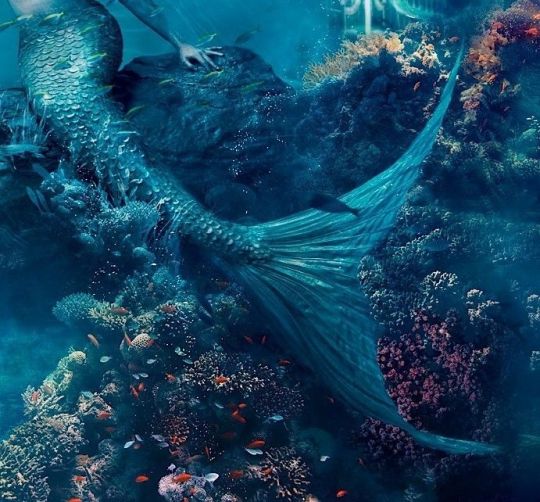


After his team returned to the base, the Colonel was informed that something strange had caught something strange in the enemy territory. He was intrigued but wasn’t fazed, assuming it was just another weapon or something. He followed the seemingly eager soldiers to the airplane hangar and once there, his eyes widened in shock at the sight of her; a dark blue-tailed mermaid on the floor.
“Heilige scheiße(holy shit)......”
She looks around at the humans around with panic, baring cat-like fangs as she hisses, causing all soldiers to jump at the sound. Most raise their guns at the mermaid, unsure and fearing what they’re facing. Colonel König, however, slowly approaches the creature. She narrows her eyes angrily, immediately recoiling from the masked man and causing him to stop in his tracks.
He reaches his hand out to her to show the creature he is not a threat but her eyes remain slit and full of distrust as she hisses at the large man before her. König remains still, his face is calm and there is no fear in his eyes as the soldiers continue to aim, unsure as to whether or not the creature is going to hurt their commanding officer. He slowly brings his hand closer to her to which she slaps his hand away.
“Do not touch me, landwalker.” She snaps, “This is your first and only warning.”
König is surprised as well but he does not show it, waving his hands to make the soldiers lower their weapons. He steps back and clears his throat.
“You can speak?”
“Do not be flattered, I have nothing nice to say to you. My silence is more than your kind deserves.”
“My kind?”
The mermaid squints, “Yes, your kind. The stories are true, you humans are nothing but barbaric and cruel.”
“Barbaric and cruel? Is this... your opinion of all humans?”
“When I meet an exception, I shall alert you. And unless you intend to kill me, landwalker, back away. I rather die than be tested on by two groups of humans in one lifetime.”
A murmur of chatter erupts among the soldiers. Colonel König holds up his hand to shut them up before turning his attention back to the creature.
“We have no intentions to harm or test you, mermaid.”
“I am not dense, human. I know what you want.”
“What is it that you think we want, mermaid?”
“The same thing the last group of humans did before you quote unquote ‘rescued’ me; my scales, my hair, my tears, and my blood.”
“You were tortured?”
She winces in pain as she pulls her tail to her scale-covered chest to show the small exposed patch of flesh where shiny blue scales used to be.
“For your kind's cruel, violent experiments, yes I was.” She scowled, “My scales are the equivalent of fingernails, besides the fact that they grow and shed from my tail, like hair. And these landwalkers manhandling me here only made it worse.”
He steps a little closer, kneeling, “May I?” He asked, reaching out for her tail.
“What game is this?
“May I... examine? Your tail that is, I swear I’ll be gentle.”
While eyeing him intensely, she slowly extends her tail with a pained groan allowing the Kortac Colonel to cautiously grab it, holding it up in both large hands. He begins to examine the exposed bloody patch of skin in front of him, grimacing under his mask at the 10 small spots where the scales were plucked from.
“When did this happen?”
“A few days ago but they haven't had the time to grow back yet. Especially since they were ripped off.”
Colonel König nods his head, “Let me take you to our infirmary. Our medics will bandage it and you can rest it while it heals properly."
“You... how can I trust this isn't some land-walker trick?”
“We are not all like the other humans you have encountered before. Some of us have morals and values, so please...”
“...who are you, giant?”
He chuckles at her observation. “My name is König.” He kneels to her and holds out a gloved hand, wanting to solidify her trust, “Will you trust me? At least enough to carry you to our medical bay?"
“You intrigue me, König.” She rests her hand in his, “I will... I am trusting you.”
König smiles behind his sniper hood and lifts her in his arms, holding her against him. As he stood up, she quickly wrapped her arms behind his neck with a gasp as she was lifted from the ground.
“I've got you.”
He starts heading for the exit of the hangar with the mermaid in his arms. As they head for the medical bay, the mermaid sees that the halls in the base are filled with humans; some of them are working, some of them are relaxing, and some of the are just doing their own thing. What the mermaid doesn’t realize, is that all those eyes are on her.
She hugs herself closer to his body, afraid and on guard as he walks past the people dressed like him. Colonel König senses her fear and immediately holds her even closer to him, wanting to make her feel protected against anything.
"They're not going to touch you."
"You're sure...?”
"It's a promise, mermaid, I’m not letting anyone close to you.”
“It's... I’m (Y/n)...”
He can’t help but chuckle again. "(Y/n), ja? That’s a beautiful name.”
“And I also wanted to apologize for insulting you.”
He chuckles, "It's okay, alright. If anything, I understand. We, uh, humans, aren’t the friendliest bunch most times."
“Oh, I'm painfully aware. But I'm apologizing to you.”
"Me? Me specifically?"
“Yes, just you... You’re the only human I’ve met to not view me for profit.”
He clears his throat as his cheeks warm up, "I can assure you that I do not see you for just profit. Of course, I can’t speak for everyone else but I see you as something more."
“More? More than profit?”
König nods. "More."
“Why?”
"I think... that might be a secret I'll hold for myself for now.” He winks, “Until we get to know each other better.”
#black reader#x black reader#x black fem reader#black fem reader#konig call of duty#konig x black reader#konig mw2#konig x reader#konig cod#konig x you#cod konig
38 notes
·
View notes
Note
I wonder why micheal keeps getting portrayed as abusive (specifically in simeon, lucifer and mammon based fics) especially when you consider that his canon self isn't that?? I know it's probably something of a scapegoat since it's easy to pin the character we know the least about as the most villainous but I'm curious about your thoughts
Personally, I think there's a few things at play. One of them is recognizing the shades of gray. Humans by nature have a tendency to sort things into black and white when they really shouldn't be, and I think this is an example of that.
Because, there is some truth to what they say. Michael can be downright creepy at times- from sneaking into Lucifer's room without permission being a clear sign of an unhealthy obsession, to the flat-out psychologically damaging stunt he pulled in Nightbringer. And don't even get me started on the angel event from the OG; I was pissed about that for a long time. He also clearly has a very prejudiced, derogatory view of demons, and is likely where Luke got it from. He's certainly not innocent.
BUT, I think people carry it too far. Yes, he's creepy, and yes he can be a colossal asshole. But he also displays clear, genuine care&compassion for others, especially his brothers, and seems to be trying his best to do good.
Such as with Simeon and Luke- he clearly genuinely cares about their wellbeing. As revealed in one of the Hard Mode chapters of Nightbringer, he was worried sick about sending them down to the Devildom, showering them with care packages and wanting constant reports to make sure they were alright. In the OG game, when he cast Simeon out, he didn't just leave him out to dry; he coordinated with the Devildom- which he's always hated- to ensure Simeon's safety, and sent his right-hand man down to protect him. He's implied to have angsted over the very idea too, having told MC in S3, "and of course, I have Simeon to think about." Both of these points will probably be their own posts eventually, because I have a lot to say about them.
And, for all his harassment of Lucifer, he seems to genuinely care about his wellbeing too. For example- saving MC's life in Nightbringer just because he recognized that they were important to Lucifer. This wasn't even because it got him closer to seeing Lucifer again; Lucifer had no way of knowing about this little favor. He did it just to make his brother happy.
There's also him cooperating with the exchange program in the first place. There was no reason Michael had to do that. In fact, considering the Celestial Realm's very traditional and conservative views, it would've been very likely for them to just say no. They didn't have to send anyone down. And yet Michael did. Not only that, but he hand-picked who to send. He clearly cares about and has stakes in this program. It seems that he's trying to change; he at the very least cooperates with those who believe there should be change.
Ultimately, he's a very flawed individual, trying to do his best by others through a lens warped by celestial propaganda and unhealthy coping mechanisms. He's a very morally gray character, and I think sometimes the internet has a hard time reconciling with that.
Especially since we don't have a face to put to Michael. That's the other issue. People are a lot less likely to sympathize with a faceless persona than they would be with their favorite hot demon boy. The brothers and even the side characters can get away with a lot more because we see and regularly interact with them. Because of Michael's secretive nature, often times you have to read between the lines to really understand the nuance of his character- it isn't spoon-fed to you through direct interaction like with many of the other characters. Because he obscures himself so much, it's a lot harder to humanize him, and to get a grasp on his motivations.
I also think a lot of people are looking for a "villain" in a story where there was never meant to be one. People seem to get this idea where every story needs to have a villain, and if they can't find one they make one. Obey Me was never about good guys and bad guys, heroes and villains. It's always been about highly flawed and dysfunctional individuals just doing their best. Plenty of drama and meaningful plot can be made from that alone. We don't need a clear villain, and it doesn't need to be Michael. I think a lot of people don't get that.
62 notes
·
View notes
Text
It's really unfortunate that a number of people (mostly white people) in the IWTV fandom here on Tumblr seem to have this watered down view of the gothic genre as "cool, sexy monster stuff." I mean, yeah. That's *part* of it, but that's like, a very high school Hot Topic view of it. I mean, nothing wrong with liking the stuff you did in high school or Hot Topic, but it shows a lack of a deeper understanding.
I know I've ragged on Anne Rice a lot here, but I honestly think that this is partly her responsibility. Did she craft interesting characters? Yes. Did she give them flaws? Yes. But does she do a good job of challenging them? Not really. In fact, the way she frames then makes it seem like they're not flaws at all. I can accept the fact that slavery was normalized in Louis time, but I cannot accept the idea if no one in the story challenging it. It is not unreasonable for Daniel to be attracted to Louis during the interview, but at the very least, he should be uncomfortable with his attraction to him. Sometimes bad people are still attractive. That's an uncomfortable truth. But AR doesn't handle it this way. She never addresses it.
So, it's really not hard to understand why her fandom carries such limited views on uncomfortable matter, because her writing didn't challenge them to feel uncomfortable with their attraction to Louis. To Lestat. To even fucking Marius (who I won't get into here. Other people have already written about him here and have done so better than I can). AR made the sexy vampire books, and her fans just go along with all the awful things they do because, hey, they're monsters and it's cool because they live outside human expectations of morality (even though Louis was awful before becoming a monster). AR presents shock value, but doesn't address what's shocking. Her fandom, in fact, seems to take pride in illustrating no shock over what is shocking. This, in my opinion, is an illustration of *failure* to create an effective gothic story.
The show does a much better job, in my opinion, at presenting something gothic. I, a Black biracial woman of the audience, should not be attracted to Lestat. But I *am.* I shouldn't be attracted to Louis, but I *am.* I shouldn't be looking at their family dynamic with Claudia in her earlier days as a vampire through heart-shaped lenses, but I *do.* And it's uncomfortable. It's supposed to be. And I think Daniel's character does a good job of bringing the audience back into the horrible reality of the situation and causes us to check ourselves.
And I think white fandom really does a disservice to Jacob Anderson *AND* Sam Reid by trying to argue with Black fandom over the subject of race. Racism is a central theme in this version of the story. But they don't want us to talk about it, because they're uncomfortable with it. They'd rather pretend it doesn't exist and doesn't need to be discussed. But it's *supposed* to make them uncomfortable. They're just not used to seeing the benefits of being challenged, because AR never did. And unfortunately, they're missing out in a very fulfilling part of enjoying the story because they want to keep themselves in a little bubble where they can pat each other on their backs for not being shocked by shocking things and never growing as people.
#Gothic genre#Anne Rice#Iwtv#Iwtv amc#amc interview with the vampire#Jacob Anderson#Sam Reid#Fandom racism#Anti-Blackness#Loustat#Lestat#lestat de lioncourt#Interview with the Vampire#Literary Criticism#louis de pointe du lac
38 notes
·
View notes
Text
The Reasonableness Theory of Good Omens

I’ve never done a Tumblr post before, but I’m going to have a go at it now, because the heaven/hell logics in the original Good Omens book (see also: the tv show The Good Place and also Terry Pratchett’s Discworld series generally) were foundational to the development of my theory of human behaviour – and I think it now explains A LOT about the Aziraphale/Crowley ending of Good Omens 2, and also what’s going wrong with us as a society.
So long story short – I’m a Cultural Studies academic at the University of Bristol, and I recently published a ‘smart thinking’ book called On Being Unreasonable: Breaking the Rules and Making Things Better (in bookshops now with Faber & Faber!). Here I explain how demands to “just be reasonable!” have been weaponised throughout history to halt social progress, from the suffragettes to Stonewall to the Civil Rights movement, up to the uproar over Black Lives Matter and Just Stop Oil protests today. Basically, what I think biblical-satire shows like Good Omens and The Good Place are satirising is exactly this: the inherent moral UNREASONABLENESS of the ‘reasonable person’, who wants things to be better but isn’t willing to break any rules to achieve it – even if those rules are bafflingly unfair and nonsensical (like the Job plotpoint, where Aziraphale began to realise this for the very first time).
When I say the ‘reasonable person’, I’m talking about the ‘moderate’ whom Dr Martin Luther King famously described in his Letter from Birmingham Jail as being almost worse than the ‘evil’ side of the out-and-out racist. This is the so-called ‘good’ side, who talk the language of progress whilst getting in the way of any attempt to realise it because they are “more devoted to ‘order’ than to justice”. In On Being Unreasonable I trace an overarching tendency to value the APPEARANCE of reasonableness (calm voices, shiny smiles, dapper suits) over the messy impoliteness of standing up and fighting back. In other words, rather than Heaven being the good guys and Hell the bad guys, Good Omens exposes how BOTH sides end up doing bad things because they’re unwilling to rebel against authority, break unjust rules/laws, and actually do what is RIGHT. We saw this especially clearly, I think, in the hell fire/holy water scene: one side might be ugly and the other side beautiful, but both sides are shown to be monstrous. “Just shut your stupid mouth and DIE already!” is still evil even though it’s said through a smile rather than a scowl.
This is where Crowley comes in. Crowley sees Heaven for who they really are. And this is why he resents being called ‘nice’ – because the qualities of niceness have historically been used as cover for tremendous evil – like how God’s ineffable command to kill Job’s children was morally horrifying, but how the Angels’ smiling promise to replace them with new children made a terrible thing seem like an act of divine grace. In many ways I’m saying nothing new here at all, I know – ‘omg the good side are actually the baddies! gasp!’ is hardly a novel literary interpretation. But it’s a bit more complicated than just that. What I’m talking about here is the specific sociopolitical mechanism by which reasonable appearances have been confused with actual moral goodness – and how this impulse to see ‘nice’ and think ‘good’ has historically been weaponised against us. It’s this that Good Omens really exposes. As I say in On Being Unreasonable, we can see this everywhere. “Think about the honeyed gentility of the American South, where smiling courtesy provided cover for simmering racial violence. Think about the buttoned-up laced-down aggression of the white imperial invader, sitting on their verandas in the Indian sunshine sipping tea. Think about the polished performances of the Nazis, with all their approving 1930s newspaper articles about impeccable manners and rarified tastes in art and dress”. In fact, there’s even an adjective for this: ‘Minnesota Nice’, which is often used as a backhanded compliment to refer to people who avoid confrontation in favour of a veneer of false politeness, and for whom calling out homophobia/racism/misogyny/etc is unforgivably rude. Nice, in this sense, can never be good, because it is being used to advance evil.
In Good Omens, what we saw is how deeply Aziraphale longs to break free from this logic, but how he can’t yet quite manage to free himself from that sense of reasonable idealism – the belief that surely the ‘good’ side of this broken system can be reformed from within. Meanwhile, Crowley is clearly being depicted as a fallen Angel in the true sense – someone who realises that the system itself is rotten to the core, and is willing to ask the hard questions and break rules in pursuit of truly moral actions, even if it costs him everything. Crowley has bitterly learned never again to make the mistake of confusing order with justice; this is a lesson that Aziraphale still needs once and for all to learn.
In the conclusion to On Being Unreasonable I set out a kind of matrix of behaviour to explain all this, where the Unreasonably-Unreasonable people are – like Hell! – “the deliberate contrarians and hate-speech purveyors and greed-is-good libertarian individualists, who think they can say and do whatever they want without consequences no matter the harm to anyone else”. Meanwhile, like Heaven, a lot of self-professedly progressive people seem to have become “so determined not to be like them that we’ve become something just as bad” – namely, Unreasonably-Reasonable people, “obsessed with tone-policing and respectability politics and endless toothless debate, happy to act the devil’s advocate and platform hate-speech and injustice so long as everyone appears to be doing it politely”. What I think we’ll see unfolding in Good Omens 3 is the revelation that what the world ACTUALLY, desperately needs is more people like Crowley, the Reasonably-Unreasonable people on whom social progress has always depended: “those who understand that civic dissent and smashing down racist statues and no-platforming bigots might sometimes be the only way to make the world a better place”.
So if God (and Neil Gaiman) really does have an ineffable plan then maybe it was this. Crowley needed to fall then, and Aziraphale needs to try to reform Heaven and fail spectacularly now, in order for us all collectively to rid ourselves of that morally-unreasonable urge to seem reasonable in the face of great injustice forever.
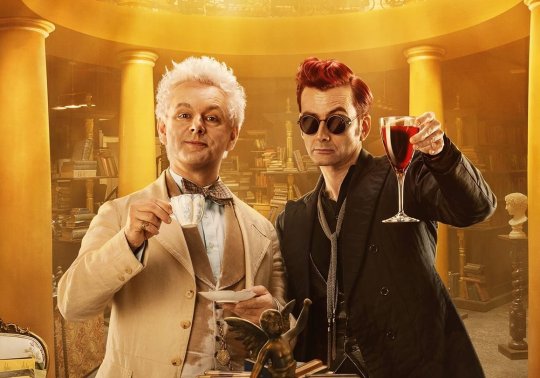
#good omens#good omens meta#aziraphale#aziracrow#crowley#good omens 2#neil gaiman#michael sheen#david tennant#ineffable husbands#good omens spoilers
100 notes
·
View notes
Note
What do you think of Sora Siruha character?
Before this chapter, i thought Ishida seems wants us to think of her character as a tragic hero and a character that is fallen after leaving yamato mori, but then he drop a chapter where she committed genocide when she was still in yamato mori, so i wonder what do you think of her character?
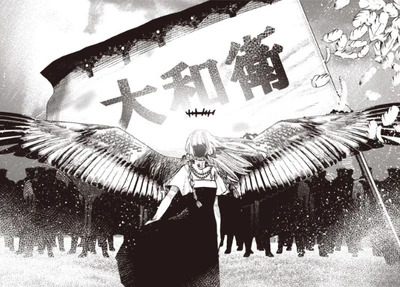
Sora Siruha is an interesting character because Nietzsche would have hated her. Yet she's still seen as morally ambiguous by both characters in her own story and members of the audience. Not that you're wrong to see her that way but Nietzsche sure did hate it was religion. So, perhaps the literal nun, with angel wings, with cross tattoos, and a black halo that doubles as a crown or thorns might be a bad guy in the Nietzsche manga.
That's not to say that she's irredeemably evil, it's just ironic the Choujin X of her generation named after the "ubermensch" represents the antithesis of a lot of Nietzsche's ideas.
Nietzsche famously called Religion the opium of the masses. in Nietzsche's view suffering was not only good but necessary to life, because it aspired people to grow and anything that promised avoidance of suffering alcohol and religion for instance stagnated growth instead of promoting it.
Religious suffering is at the same time an expression of real suffering and a protest against real suffering. Religion is the sigh of the oppressed creature, the sentiment of a heartless world, and the soul of soulless conditions. It is the opium of the people.
So, it's not coincidence in the Nietzsche manga that Sora who has so many religious associations tied to her is also, an opium addict who cannot survive without it's pain numbing effects.


If by Nietzschian philosophy pain is a part of the human experience, then by losing her pain, Sora Siruha also lost her humanity which is heavily implied to be part of the cause of her mental spiral.
One other thing associated with Sora is that she uses what are primarily utilitarian views to justify her atrocities - something else that Nietzsche hated as a philosophy.
So Sora believing that her future visions will come to pass goes on to committ atrocities in order to avoid even greater atrocities. Let's say that her visions are in fact one hundred percent correct. That Sora killing 200,000 people would avert the deaths of 2,000,000 or more.
Sora's reasoning in this case is purely utilitarian.
Utilitarianism actions are morally permissible if: They produce at least as much or more net happiness as any other available action. Everything should strive for a balance of happiness over suffering.
By Utilitarian reasoning her actions are morally permissible. Sora herself does not want to kill Anitise, she takes no joy in it, but she believes like any utilitarian she's responsible for bringing the most happiness over suffering to the world.
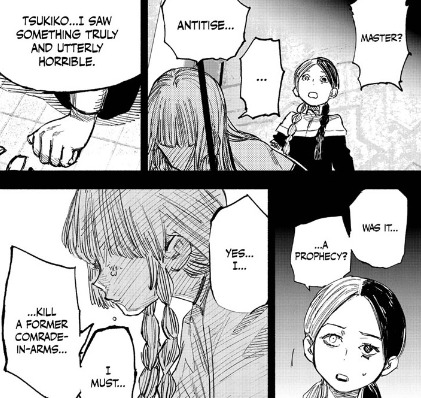
However, even if Sora's vision was 100% correct and by pulling the lever on the trolley problem and killing 200,000 she saved 2,000,000 Nietzsche would still have a bone to pick with her moral reasoning.
Nietzsche famously hated Utilitarianism. because it ignore the value of suffering, which strengthens the man. He saw that doing every and all actions for the sake of the "greater good" was something that denied the individual and discouraged individual development.
Nietzsche's criticism is that value is not something that can be quantified or proven. You can't mathematically measure in an objective sense, the suffering caused by your actions, the benefits caused by your actions. There's no universally agreed upon value for human life.
What is the "unit" of one human life?
Why are the 2,000,000 people that Sora saved more worthy of life than the 200,000 that she killed. What justification can Sora have other than "that's a smaller number." A person among the 200,000 killed could have grown up to cure cancer. Of course, even if the 200,000 weren't especially talented people, even if they were all going to grow up to work at mcdonalds why are there lives inherently worth less than the 2,000,000 that sora decided to save?
Sora is not a nihilist, she is a pure-hearted utilitarian who's actions are taken to give pleasure to as many people as possible but one more obvious criticism of her moral reasoning in choosing to sacrifice the few to save the many is that she is not an unbiased judge of values.
For example, if Anitise really did become a mad king then who would his victims have been? If he invaded Yamato Mori and killed 2,000,000 then why are the 2,000,000 lives of the Yamato Mori citizens he killed worth more than the 200,000 people that Sora killed preventing his invasion? It would be because being a citizen of and responsible for Yamato Mori Sora is unconsciously biased to put her own nation above Anitise's kingdom. In that sense, she's not really acting for the greater good, but rather the national interests of her country but she's still posing herself as a savior figure.
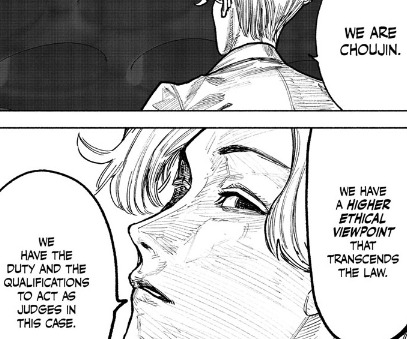
Sora goes on to commit these atrocities, while also continuing to see herself as a savior and believing she's operating from a higher moral viewpoint than everyone else. Yet, you can easily point out where her biases are as I just did.
In addition to the fact that we have no way of knowing if Sora's visions of the future actually are true. The fact that there are two people with future seeing powers (three if you count Tokio's dreams) who can see different things then points to the fact that Sora's visions aren't 100% true. However, even if you give her the benefit of the doubt that her prophecies were going to come true if she didn't do something, you can still make moral arguments against her actions as I just did above this section.
Sora is also extremely biased in other ways. In her origin story, she saw a vision of Queem coming to burn her convent, and was unable to stop it from happening. This clearly has affected her for all of her life, as even when presented with direct evidence that her prophetic dreams might not be true (such as another seer who disagrees with her) Sora doesn't even consider that possibility or hesitate to commit atrocities, because she's still guided by her guilt over being unable to stop her convent from being burnt.
In Tokyo Ghoul, Yoshimura once theorizes that Ghouls and Humans are psychologically the same, but because Ghouls live violent lives they eventually lose their empathy and stop seeing any value in human life as a coping mechanism.
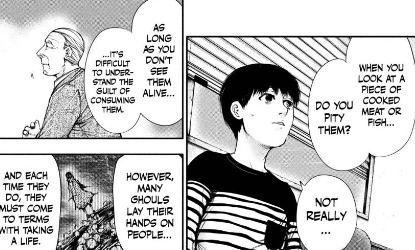
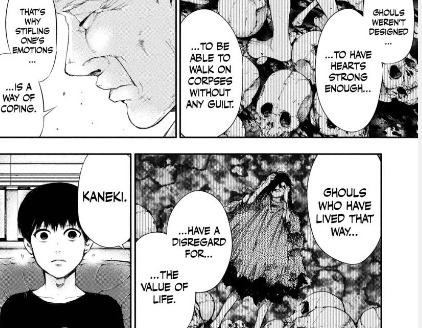
I think Sora's slow corruption makes sense through this lens, not because of her future visions but rather because of the amount of power she had.
Choujin e aren't any different from human psychologically, they experience human emotions, but convince themselves they are different because one they're prone to get in more violent situations, and two the power they wield leads to them developing superiority complexes.
Sora plunged herself into war and had to walk on too many corpses in order to get stronger and gain the strength to fight Queem, but it's clear she didn't stop there after Queem was defeated. After Queem died Sora became the war-monger, and why? Her visions provide us one reason, but like, Sora didn't consider alternative means like diplomacy or warning anitise of what she saw? She just jumped straight to launching a modern day crusade against a foreign country, why?
Was it just easier for her to consider a military invasion because after having been through the hell of war, 200,000 became just another statistic to her?
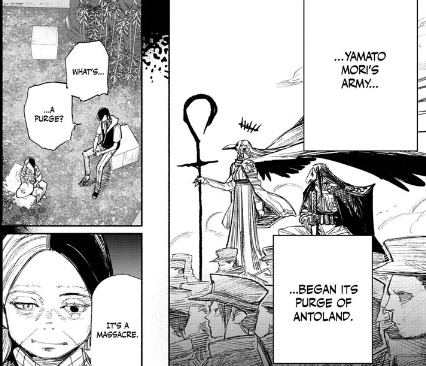
What other reason than she had the power to do so, and Sora's superiority complex told her she had the right to wield that power however she chose to do so.
Sora and her savior complex, provides an uncanny mirror to Queem and his choujin and his choujin supremacy doctrine. Sora may have believed herself invading Antoland in order to prevent a future disaster, but when has a foreign country invading a soveriegn territory "for their own good' ever historically been a good thing. Sora may not have preached choujin supremacy but her actions don't make her too much different from Queem in the end.
Then, there's the possibility that Sora's prophecies might not even be nearly as true or certain to happen as they think they are. One of the birds basically spells it out to Tokio, that humans wanting to know the future is just wishful thinking.
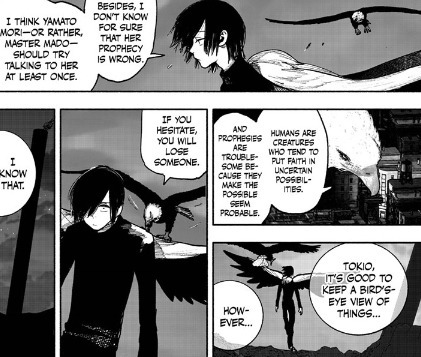
Which puts Sora's absolute certainty in a new light. Is Sora's beliefs in her prophecies just a longing for control, the kind of absolute control over the future that nobody in the world but god is supposed to possess. Sora wanting to take God's place in knowing the future and being able to control her destiny goes all kinds of wrong.
I'm reminded of Attack on Titan where Eren coming into contact with the paths and being able to see the past, present and future at the same time doesn't give him godlike power, but reduces him to a helpless child. Eren's ability to see the future ends up bringing into existence similiarly to Sora, a future where he's the one comitting the atrocities.
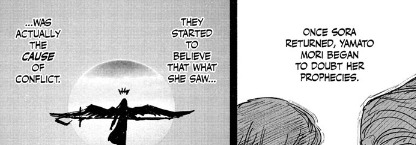
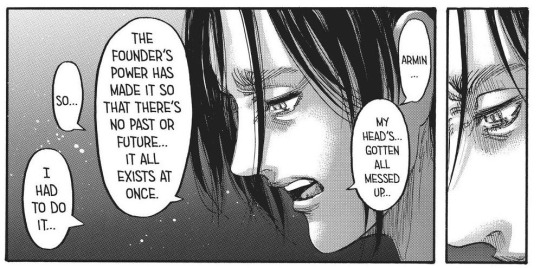
There's also Paul Atreides from Dune who is given the power to see the future, and despite knowing and feeling guilt for a long time that some of his actions might lead to him releasing a holy war against the galaxy and killing billion, goes on to follow the future timeline he saw where he caused those atrocities anyway.
The absolute godlike power to know the future for all three of these characters Sora, Eren and Paul actually leads to them committing atrocities, not averting them as they'd hoped.
Yet, there's the tragic element of the fact she was just sixteen when this destiny was thrust upon her.
In Tokyo Ghoul Eto once referred togod as a child with extraordinary power to justify the world being as messed up as it is. Doesn't this fit Sora Shihouin as well? A child given way too much power and suddenly thrust into a leadership position?
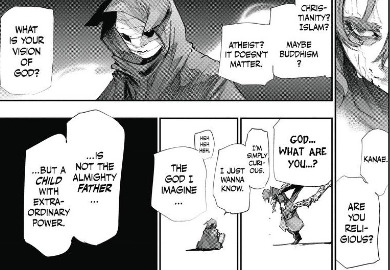

In that way Sora reminds me tragically of X-Men characters like Jean Grey, if someone is given the power to see the future, or the insane powers of the phoenix that Jean Grey was given would they really have the moral fiber not to abuse that power? Can anyone wield that much power and not be corrupted by it?
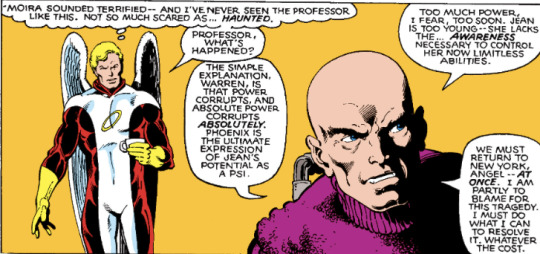
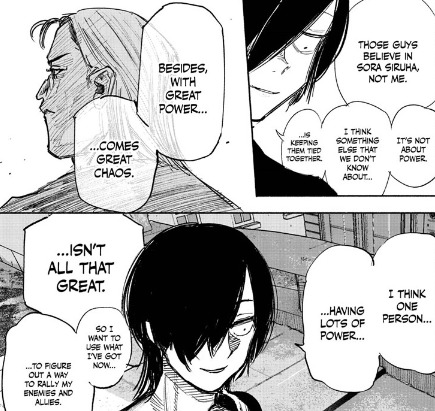
24 notes
·
View notes
Text
Watched a banger Spideypool animatic and the more I think about it the more they just work for each other? In a lot of ways it’s Black Cat and Spider-Man but it’s works better imo.
Deadpool does many morally wrong actions similar to Black Cat but the difference between them is that Deadpool actually cares about Peter Parker, but he also cares about Spider-Man because he comes to learn that they’re one in the same. Black Cat on the other hand, as much as I love her she does not give two shits about photographer for the Daily Bugle, sweet dude Peter Parker, and I do appreciate fics and stories where she does but I can’t ever see her caring for that.
Also I think it’s majorly beneficial for Spider-Man to date another super person. Him and Kitty Pryde worked for the most part in the Ultimate Universe ( most of it was dragged down by needless drama to just get Peter and MJ back together so it was a bit rough ) but I think out of all the super human love interests Wade just works the best? He can’t really die, his healing factor prevents Peter from having to be really worried about him during battle and a key aspect of the team up comic I enjoyed was that Wade was entirely willing to stop killing for Spider-Man.
Deadpool when the hot spider guy gets mad at him for killing people so he just stops because he genuinely likes this guy and idk it’s sweet.
It’s often written off as a joke ship in a way, and I have a lot of problems with how they write Peter in the team-up comic personally- ( I HATE PARKER INDUSTRIES. ) but when you really think about it they actually work really well and are pretty healthy even outside the fun dynamic that initially draws you in.
I think because of the amount of love interests Peter has, I tend to have a different favorite ship based on his age group ( of course it depends on how the writers write the love interests too like sometimes Mary Jane sucks although she gets shit on way too much for it. )
I am an enjoyer of married MJ and Peter being happy like in Spiderverse but my favorite ship from the 25-30+ era for Spidey is definitely Spideypool, sorry MJ I do love women but Deadpool just wins her.
On the otherhand his early college era? Mary Jane 100%. In High School it’s more difficult because it really varies adaptation to adaptation- like in the OG comics Betty is a good first love interest despite poor 60s views of women- in the Ultimate comics Kitty Pryde is great- in Spectacular Spider-Man Liz is wonderful- in Marvel Adventures Chat is wonderful so I honestly can’t pick a favorite because it varies so much in this period in Peter’s life.
( Also Gwen is not included here just because she’s written the most inconsistent actually imo. She’s at her best in the Andrew Garfield movies but she’s bad in the OG comics imo. She’s a mixed bag in Ultimate Spider-Man and I much prefer her as not a love interest there. In Spectacular Spider-Man she’s fine but I don’t like how they forcefully break Liz and Peter up just to get them together I hate that trope. And I consider Spider-Gwen as not a Peter love interest sooo… )
#aaronymous ramblings#spiderman#spider-man#spider man#spideypool#peter parker#wade wilson#honestly just rambling about spidey love interests he has too many
64 notes
·
View notes
Text
I feel like the large amount of capital-r Rationalist Worm fans has really negatively influenced some people’s interpretations of Taylor and her motivations. I sometimes see people treating her as this sort of platonic idea of utilitarianism or whatever moral philosophy you think she subscribes to, whose strengths and flaws are entirely the strengths and flaws of that philosophy in its ideal form. And having read the “rational fic writing advice of Eliezer “famous Harry Potter fic writer and comparer of Taylor to Hillary Clinton” Yudkowsky I can see where this idea comes from, because this is exactly how he says characters should ideally be written. He says he dislikes “gray and gray morality” where everyone is shown to have their flaws and hypocrisy, instead he likes conflicts where both sides are truly good rather than gray and the conflict is that they are completely true to different philosophies of what good is. To some extent, he has a point in this; there are works that use the existence of hypocrisy and self-serving as a “cheat” out of and easy answer to a conflict that really is supposed to be a clash between two pure “good” philosophical ideas (Pokemon Black and White my beloathed...). But in the end, characters who are just platonic ideas of philosophies are for philosophical essays and tracts; literature is for portraying humans in all of their psychological complexity, sometimes self-serving motives, and ways that, due to their individual humanity, they aren’t just walking philosophical mouthpieces and don’t match up completely with an ideology.
That being said, Taylor is actually quite human (and a human teenager at that, with all the expected immaturity) in this way and from author comments it seems that this is completely intentional. She doesn’t simply state her belief that Benevolent Warlordism is Better than the Corrupt Current Authority throughout the story and spend the whole time as the embodiment of that ideal. Instead, she starts out wanting to be a hero, and then she has a complete failure of her typically paranoid mindset with regards to Coil (taking him at face value of wanting to improve the city even though every politician says that and look how that usually turns out) because it’s what she WANTS to believe, so she can keep her new friends after feeling isolated while morally sanctioning her actions, and then does a surprise Pikachu face when it turns out Coil actually does bad things and her support is helping him do bad things, then spends the next few arcs running around trying to fix the one bad thing she feels particularly guilty of. It’s only after already setting herself up as a warlord to fix said guilt, solely caring about Dinah with the people she saves being incidental, that she justifies herself as the lesser of two evils compared to the corrupt status quo, a lot of the corruption of which she didn’t even KNOW ABOUT before already going ahead and deciding she was going to be a criminal. I’m saying this with genuine love for her character and acknowledgement that she isn’t a horrible monster and does some pretty admirable stuff, especially given her age and situation, and she certainly was always cynical, paranoid and judgmental with a determination for justice even if she didn’t know all the details of what was wrong with her world at the beginning, but it’s ridiculous and detracts from understanding of her character as a character and not a rationalist talking point to see her as some pure philosophical ideal from start to finish who is never making up her ideology as she goes along.
204 notes
·
View notes
Text
Undertale analysis: Chara was a bad person but not because they were an "evil serial killer child" like the fandom portrays.
TW: mentions of mental illness, self harm, and suicide.
SPOILER FOR UNDERTALE. yes this game is 8 years old and scarily popular, but its still worth playing! its 10 bucks on steam! get it!
Post also contains stupid edits I made to ENHANCE your experience by at least 50% guaranteed or your money back (post cost $0)
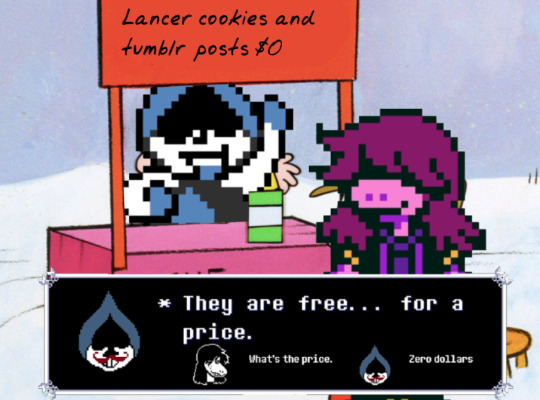
first: some backstory.
I played Undertale way back in like, 2016 when the game was still fresh yet gaining popularity quickly. The fandom soon after became criminally insane and went on a moral panic where people were harassed for "playing the game wrong". I remember stories of youtubers cancelling Undertale let's plays because they would kill a character and people would get upset.
other than AUs, the biggest thing that stuck out to me was the strange obsession with claiming Chara is an evil demon child who is the root of all evil and eats puppies and enjoys drinking the blood of the innocent.
and then counter-culture made it so that chara is actually innocent and that the PLAYER is the horrible evil monster eating puppies etc etc.

two extremes that i half-agree with, but mostly disagree with. There was an INSANE black and white mentality that flooded the Undertale space with no breathing room for mistakes.
nowadays people have matured and the fandom calmed down, so now would be a great time to explain why i think Chara is a more complex character than people give them credit for.
please don't hurt me.
1- Chara very much had mental health issues.
and not in the horror movie way where they were a caraaazay evil serial murderer
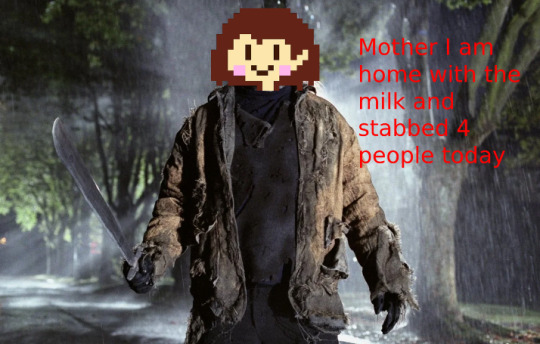
a huge misconception is that people assumed the garden tools in toriel's house being dulled was somehow "proof" that Chara was an evil serial murder or something.
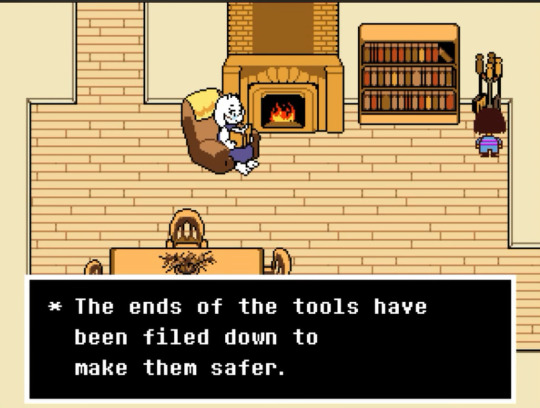
though... I think people also forget Chara heavily hinted at struggling with serious depression and misanthropic tendencies.



Chara climbed the mountain to end their own life.
the reason the garden tools were dulled wasn't because the Dreemurs were trying to protect other people from Chara, they were trying to protect Chara from themself.
it baffles me how a lot of people didn't catch onto that. It could be that we were young teens and didn't know better... but i digress!
"but kat? how is Chara a bad person ? are you saying people with depression are-"
get that objectively wrong idea out of your head. Having a mental illness does not make you a bad person. If you struggle with suicidal thoughts please get help from loved ones and don't EVER think you are a bad person for struggling.
no. chara is a bad person because...
2- Chara was a bitter misanthrope that didn't care about anyone else or their feelings.

there are several lines of dialogue that point to the fact Chara did not like humans. There is a high probability that Chara had a hard home life before falling to the underground and that is possibly why Chara was the way they were.
I am not going to send you a million screenshots as to every single bit of evidence of this, I am not made of time and jpegs. (besides i spent the entire budget on photoshop edits)
I am however, going to send you the most damning evidence on my side: the true lab tapes.
In the pacifist run, you can visit the true lab and find Asgore and Toriel's old home videos.
The tapes basically showcase Chara's plan to Asriel where they were to eat the butterscotch flowers, and then Asriel will absorb their soul when they died.
youtube
you can watch this youtube video on all of the true lab tapes.
to recap the story, Chara died, Asriel absorbed the soul, took Chara's body to the human village and then the humans thought Asriel killed Chara. Asriel refused to fight, walked back to their home and died in the flowerbed.
Later on if you talk to Asriel, He mentions he wasn't the one who went to the human village, but it was Chara that was controlling him. He refused to hurt the humans and fight back and essentially they were both taken down.
so here are my thoughts (please remember this is my interpretation you are OK to disagree with me)
-Chara probably just used the freedom of the monsters as an excuse to off themselves, Then put that emotional responsibility on Asriel.
-They then USED Asriel's body to try and enact revenge on the humans in their death as some kind of messed up murder-suicide but in the wrong order
-This ends up Killing Asriel, then he later became a bitter misanthropic husk after being reincarnated by Flowey. Possibly due to the trauma.
-This ends up putting the ENTIRE underground in a depressed state with no hope and causing a massive war with the humans
-their adopted parents are now divorced due to this tragedy and both Toriel and Asgore started to have conflicting issues on the topic of humans
-Asgore basically trapping everyone with him in his own grief because he didn't want to actually face what happened and played the long game collecting souls one by one.
-Toriel struggling to move on and essentially trying to mother any human that falls down without facing her demons.
-Litterally all of undertale happened.
essentially
Chara was not a bad person because they were a child version of Jason Voorhees
Chara was a bad person because they manipulated their family into having emotional responsibility for their self-inflicted death and hatred of humanity. They made their issues everyone else's problem and didn't consider how their horrible actions would affect others.
and in a way, that is one of the morals of Undertale
If you don't care about others and how your actions will affect others, then you would be making the world a shitty place in the end.
Lets get back to that thing I said earlier about fans harassing other players for little mistakes.
killed Toriel on your first play through ? congratulations! you are a horrible irredeemable person who deserves to get death threats ! /s
God forbid we have nuance and acknowledge that most players at this point feel BAD about what happened since this is their first play through! And that they CARE about what they did to their new friend!
These kind of people ignore the fact that the issue with the genocide run wasn't just the deaths, but that the player didn't consider how the monsters felt after you just ripped away their happy ending.
which is the mentality that both Chara and Flowey had.
youtube
here is a video i recommend.
to quote this video about the sans fight: "They call out the player not for acting immorally but for acting with no moral guidance whatsoever. Flipping back and forth between good and evil for no real reason except that they want to see what happens. In the boss’s own words, committing genocide “because you think you can, and because you can, you have to.” "
Chara offed themself and made Asriel emotionally responsible for Chara's fucked up revenge fantasy without considering others feelings
The player restarted the timeline (more than likely the good ending) to kill everyone all for the reason of curiosity without considering others feelings.
the reason why Chara goes after you at the end of the genocide run is because you basically VALIDATED the deep dark desires of a mentally damaged person and made them watch their loved ones get ritualistically murdered.
meanwhile in the pacifist run (with no history of the genocide path on your file), you simply let Chara remain as they were when they passed away. You didn't validate their dark mentally unstable desires, you simply shown Chara that the world isn't a horrible place and that actually caring about other people leads to a better life. If you HAVE played genocide before the pacifist ending, then the lesson does not sit because you still basically led them down a dark path in the end.
By caring about how others feel and the impact you leave on people, you are helping retain hope for a better future for everyone, and that is one of the many reasons why i love Undertale.
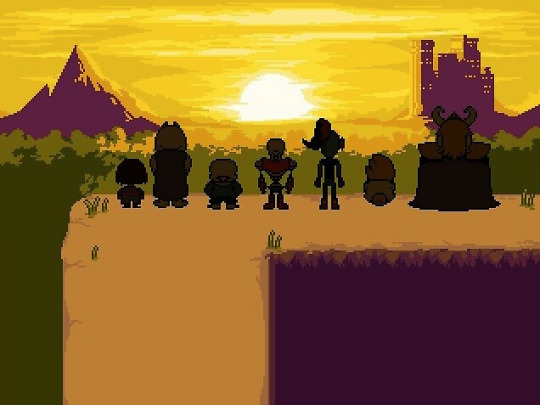
thank you for reading this massively long analysis, it took me a lot of time and effort to get this put together.
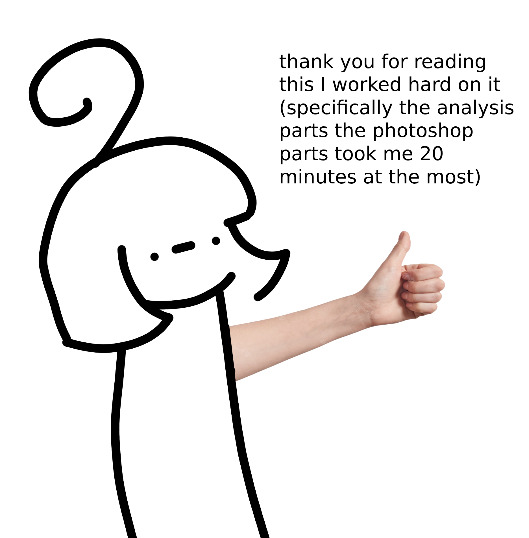
#Youtube#undertale#undertale chara#undertale asriel#asriel dremuur#asgore#toriel#undertale theory#gaming#video games#pc gaming#videogame#games#writing analysis#meta analysis#media analysis#analysis#character analysis#zero punctuation#undertale analysis#theory#speculation#undertale memes
102 notes
·
View notes